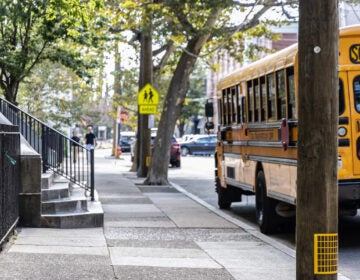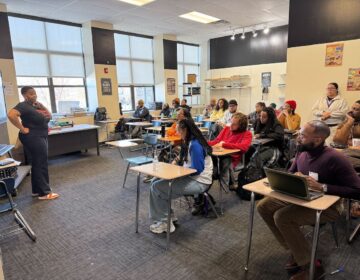Project-based learning and standardized tests don’t mix
Can the long-struggling Philadelphia school system change how we measure success by focusing on meaningful work instead of test scores?
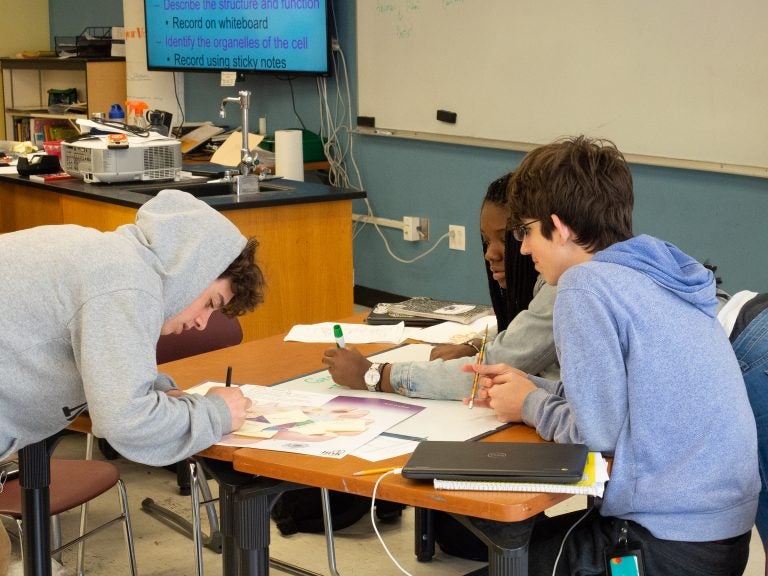
Ninth-graders at the Science Leadership Academy work on a group project in science class. (Amadou Diallo for The Hechinger Report)
In a city that’s struggled to meet the educational needs of many of its children, especially its most vulnerable ones, a select group of district high schools is shunning the traditional classroom model in which teachers dispense knowledge from the front of the room and measure progress with tests. Instead, the schools have adopted an approach that’s become increasingly popular among education advocates and funders: project-based learning.
In this model, students embark on in-depth investigations relevant to their lives and their communities. Projects are organized around the development of skills like student collaboration, problem-solving and self-reflection through assignments that blend research with public presentations. They’re precisely the skills that colleges and employers say graduates need for success.
Yet, in a school district where more than half of 8-year-olds are reading below grade level and a third of high school students don’t graduate, there’s an urgency to demonstrate improved results. One of the challenges facing a project-based learning (PBL) model lies in measuring the very benefits that characterize it. “We haven’t figured out how to assess the outcomes of PBL and that is a huge issue,” said Maia Bloomfield Cucchiara, associate professor at Temple University.
Standardized tests don’t measure student engagement or deep thinking about relevant, meaningful content. The tests have their place, said Cucchiara, who also serves on the board of the city’s newest project-based high school, but “they don’t begin to capture all the things that we’re hoping [kids] will get out of this education.”
That’s a potential liability in a city looking to change the narrative of an urban school system that persistently lags behind statewide averages in academic proficiency. Philadelphia’s move toward the project-based model is part of a broader push to open alternatives to neighborhood comprehensive schools, which have struggled in the face of chronic underfunding.
Project-based learning advocates are confident that the model can succeed in Philadelphia by providing students with skills that translate equally to both postsecondary and career options. Less certain, however, is whether its adoption can push educators, students and families to re-examine assumptions about the very purpose of high school. Is the goal to improve test scores or prepare students for adulthood?
At the city’s project-based schools, the student experience is markedly different from that in more traditional high schools.
Spread out among the retro-chic sofas and love seats of the Bar Hygge brewpub in Philadelphia’s gentrified Fairmount neighborhood, a class of ninth-graders from Vaux Big Picture High School listens to restaurant co-owner Stew Keener talk about the collaboration and problem-solving that occurs on a daily basis in the food business. “Every meal service here is like the fourth quarter of a tie ball game,” he told them. “So when a problem comes up you can’t look for somebody to blame, you have to work together and come up with a solution.”
The message of teamwork and accountability, all in the service of a tangible product is, by now, a familiar one for this inaugural class of students at Vaux, the newest addition to Philadelphia’s network of recently opened small high schools designed around the project-based learning curriculum.
The visit to Bar Hygge is part of a required course in which freshmen spend one afternoon each week visiting a different business or community organization in order to identify internship opportunities they’d like to pursue in their sophomore year.
The internships will serve as a linchpin of the school’s “real-world learning” academic model, said David Bromley, founder and executive director of Big Picture Philadelphia, which started the school. “For us, PBL is when they’re developing projects that they’re interested in with somebody in the community … projects that have some kind of impact. Our goal is that everything they learn in the classroom they apply in their internships.”
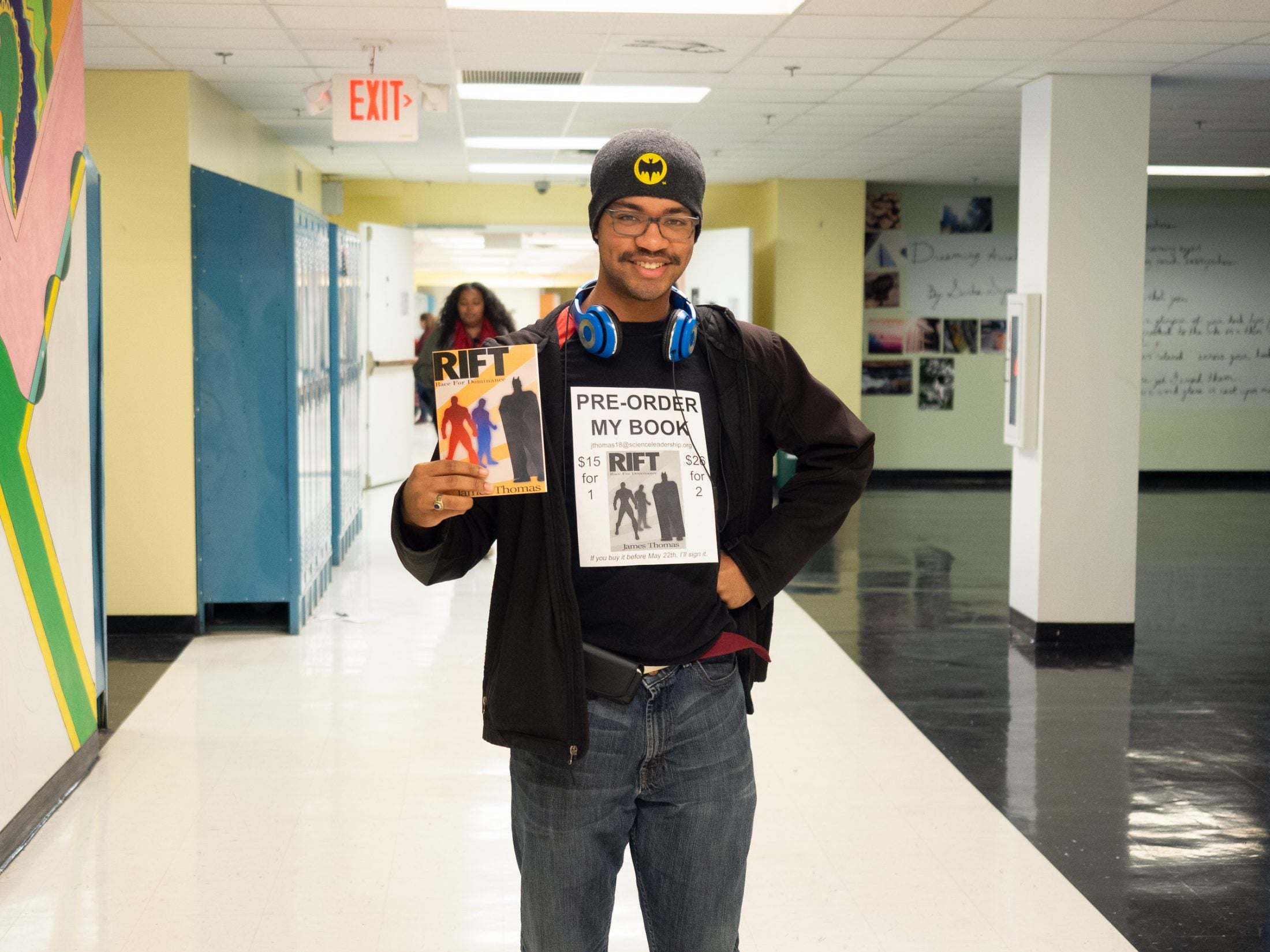
Vaux principal Gabriel Kuriloff emphasizes that the school has developed rigorous internal assessments to measure progress. “We’re getting an incredible amount of data about our students on the ground. But that doesn’t translate to a school report card,” he said, referring to the annual assessments that highlight a school’s performance on standardized tests. “There’s no [statewide] assessment for being able to look people in the eye and speak clearly.”
One of the barriers to measuring the effectiveness of the model is that there’s no universal standard for what constitutes a project-based learning curriculum. At Vaux, the model is designed around the internship program. Some schools have adopted a more career and technical education approach while others focus on projects tied to community needs.
At The Workshop School, a project-based high school just a few miles west of Philadelphia’s Center City, more than 50 percent of each student’s day is dedicated to the research and implementation of a project, from designing a solar cellphone charger for personal use to auto repair for neighborhood clients (the school houses automotive and woodworking facilities). College-bound 18-year-old senior Miracle Townes has dreamed of owning her own businesses from an early age. She’s always been a self-motivated student, but what’s changed during her time at the school has been her ability to work with others. “When I came here,” she said, “I didn’t really want to share my work with people. I used to take the projects over and just do it myself, like ‘I’m gonna get us all an A on this project.’ But here you have to make sure everybody participates.”
What she’s learned, she says, is how to recognize group dynamics. “We have a few people in my class who are shy and don’t like to talk,” she explained. “If I’m placed in a group project with them I won’t say anything at the beginning even if I already have an idea because I want to hear from them. In my career I’m going to be working with other people and bringing my ideas to the table. Now I feel like I can tell when I’m talking too much, so I’ll know when to pull back.”
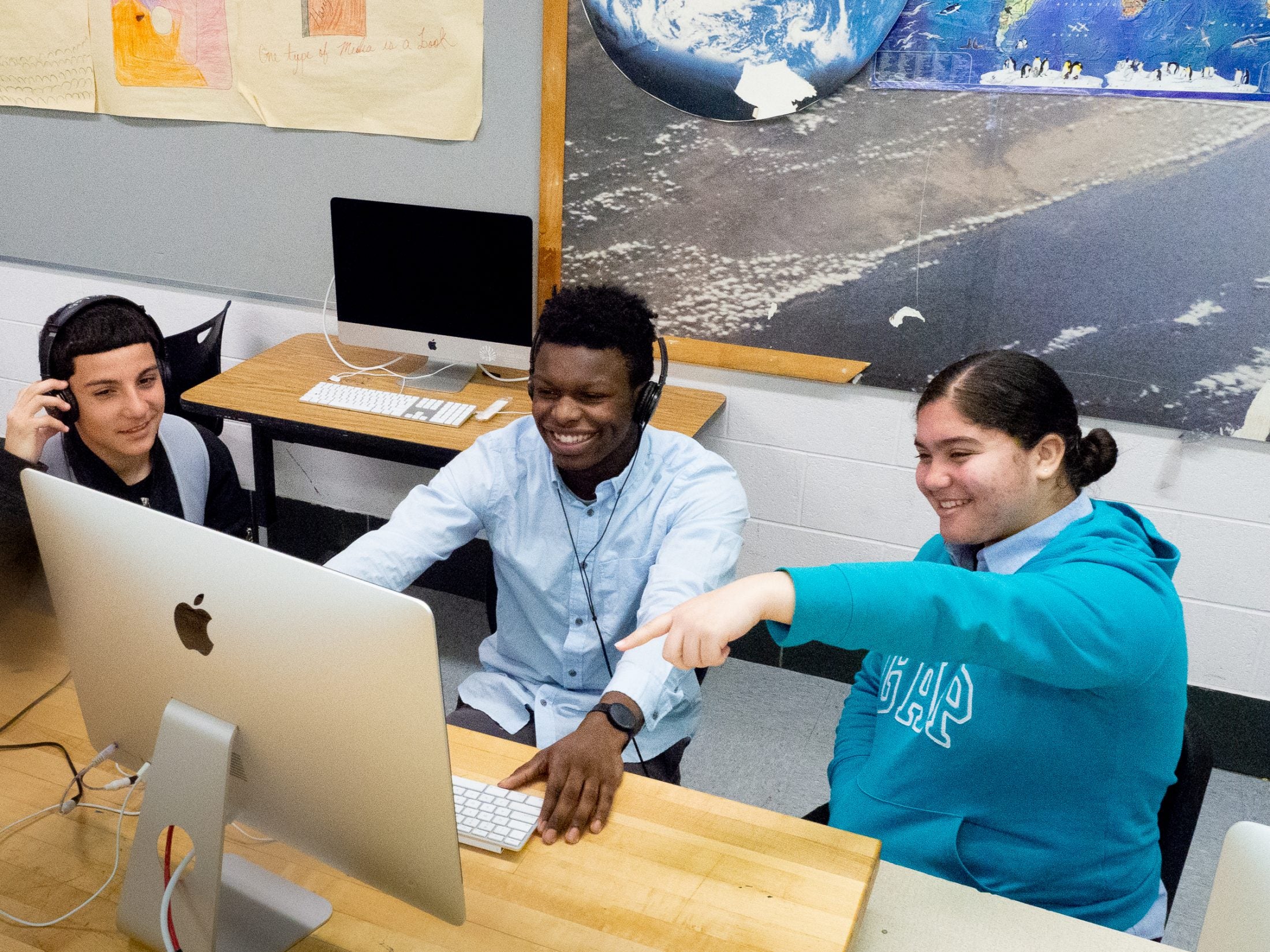
The process of learning is just as important as the resulting product, said Workshop principal Simon Hauger. “For our kids, we want the work of school to be closely tied to the work that’s going to be demanded of them as adults.”
Hauger doesn’t sugarcoat the challenges that his students face. “Our kids are dealing with the trauma of poverty,” he said. (Eighty-eight percent of the school’s students qualify for free or reduced-price lunch, a national measure of poverty.) Hauger believes that the project-based learning framework is flexible enough to accommodate the needs of schools serving affluent neighborhoods and those serving under-resourced neighborhoods because, at its core, he says, is the effort to build a real sense of community where kids feel safe enough to take risks, identify their passions and act on honest self-evaluations of their strengths and weaknesses. High school, he said, should be a place where students “develop a deep sense of who they are and tie that to a future vision for themselves.”
Education advocates say that, looking beyond test scores, a more accurate measure of success for Workshop, or any other high school, should involve following kids in the years after graduation. Are they engaged in a postsecondary experience that’s meaningful, like working at a living wage job with upward mobility or attending a college or technical school?
Fostering that kind of success isn’t easy. It demands unwavering commitment from teachers and stable leadership through the inevitable challenges. North Philadelphia’s The LINC High School, set in an area with one of the city’s highest violent crime rates, has faced several obstacles in its short history. Designed around a project-based learning curriculum when it opened in 2014, the school’s founding principal announced she was leaving for a job in Baltimore just days into the first school year, a move that led to an exodus of some faculty and students and a retreat to more traditional methods.
Current principal Bridget Bujak says that following the upheaval of having three principals in a single year, the school did not begin to reintroduce the schoolwide project-based learning curriculum until 2017. “Everyone really struggled with the model,” she said, noting that as a nonselective school, she has some ninth-graders coming in at a kindergarten reading level. While the program is less hands-on than Workshop’s, student work remains focused on the surrounding community. Recent projects involved creating designs for residential construction and analysis of neighborhood crime patterns.
“Projects are really hard, collaboration is really hard,” said Bujak. “For this to work there has to be a culture of care for each other. And when there is friction among students or teachers we have to put it on the table. We have sit-downs, we have conversations. We can’t ignore it.”
Project-based learning’s student-focused approach, which values the process of learning for each child rather than simply recording test grades, forces everyone in the building to work more closely together, Philadelphia educators in the project-based learning schools say. The result has been strengthened relationships between students and teachers, helping schools be more attentive to their students’ needs beyond academics.
Sixteen-year-old junior, Rosbeiris Gomez, who will be taking community college classes during her senior year, says the work at LINC has been challenging and meaningful. But just as important, she adds, is the sense of care, which has allowed her to talk to school staff about personal issues in situations where she has needed outside help. “Everybody here knows each other,” she said. “There are times when I walk by Ms. Bujak in the hallway and she’s like ‘Rose, come here.’ She wants to catch up if it’s been a while since we have talked because she knows that since my first year, when I was down or feeling sad, she would be the one I would go to.”
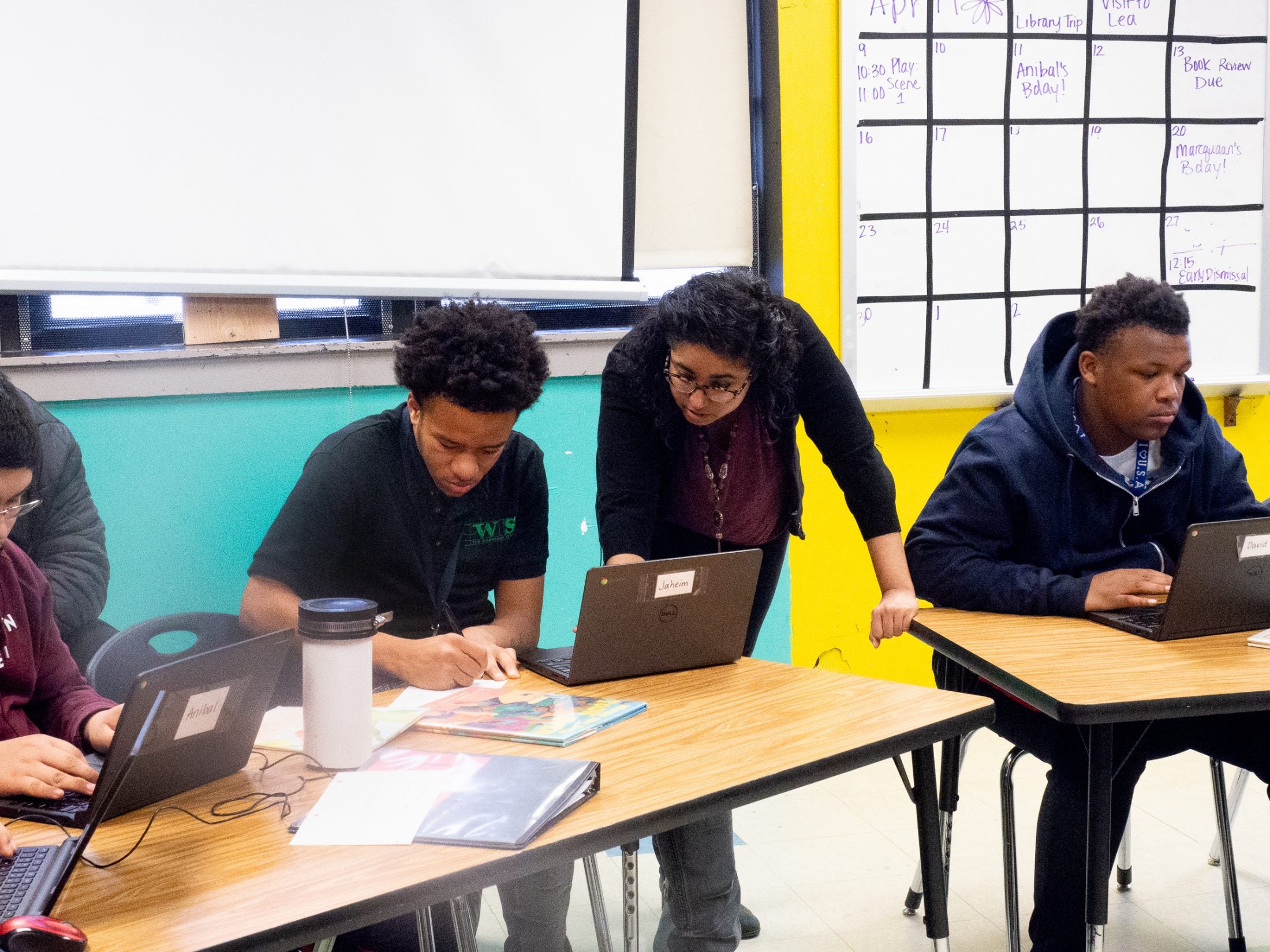
Building meaningful, caring relationships like these is crucial to success, teachers and principals say, but is not something you’re rewarded for on a proficiency test. Philadelphia assistant superintendent Christina Grant, who oversees the district’s network of project-based learning high schools, stresses that while project-based learning schools may put an emphasis on difficult-to-measure metrics, they will be held to the same level of accountability as other district schools. “None of the things we measure have shifted,” she said.
If the project-based learning schools show measurable gains in test scores or graduation rates, she said, the district will look to them for methods that can be expanded to primary schools.
An unqualified success for these new schools would be results like those at Science Leadership Academy, a magnet school that is home to the district’s longest-running project-based learning program, which opened in 2006. The school combines rigorous research with student-driven projects that have impact beyond the school building. One student project involved putting on a city-wide Ultimate Frisbee tournament. In the 2016-17 school year, 99 percent of its seniors graduated, and 84 percent attended college immediately afterward. Algebra, Biology and English literature proficiency scores at the school are more than double the district high school average.
“As a magnet school,” said Science Leadership Academy principal Chris Lehmann, “we need to be able to prove that the learning we engage in here shows up on the test … without falling into a teach-for-the-test problem. It’s a balancing act. It always has been.”
It may prove difficult for other schools to replicate Science Leadership Academy’s performance, however. As a magnet school, it has selective admissions and attracts students from a wider range of socioeconomic backgrounds (fewer than half its students receive free or reduced-price lunch, for example) than the city’s other project-based learning schools.
Lehmann acknowledges the inherent advantages at a school that’s able to choose its students — applicants must meet minimum grade requirements and sit for an interview — but, like his counterparts at Philadelphia’s nonselective project-based learning schools, he argues that we need to be taking a more holistic view of school performance. “How you judge a school is an incredibly nuanced thing,” he said. “The way that we take care of each other and the way that we learn are intertwined.” There may not be a quantitative metric to assess whether students are being provided with meaningful work in an environment that lets them know they are cared for, but Lehmann believes that without those components, grades and test scores become an end unto themselves.
Tamir Harper is an 18-year-old senior at Science Leadership Academy whose passion is education reform: In 2017 he founded a nonprofit that advocates for quality urban education. He says that when he arrived at the school he was obsessed with grades. “I just wanted to know ‘How can I get an A?’ I didn’t care if I was learning, or comprehending,” he said. “Now I’m a student that wants to learn, and I don’t worry about the end result [grade]. I’m into the process.” He says a big part of that shift was the relationships he forged at school. “We’re not just project-based, we’re a community-driven school,” he said.
Fellow senior Madison Militello, 18, says her middle school was very strict, with no room for individual connections. “Here I don’t feel like the teachers are above me. I feel like we’re on the same level,” she said, noting that she’s still close with some teachers even though she doesn’t have their classes anymore. “You can’t teach a group of students you don’t have a connection with.”
That sentiment was a common refrain at Vaux, LINC and Workshop, each of which offer slightly different approaches to project-based learning in underserved communities. Educators at each are confident that the skills their students are acquiring — collaboration, critical thinking and problem-solving — will eventually manifest themselves in improved results on more traditional metrics like math and reading tests. More importantly, however, they believe that students will be much more prepared for the real world when they leave school. Whether project-based learning done on a larger scale can turn the tide in Philadelphia is another question.
“You can create the perfect school model and it’s still not going to solve American poverty,” Hauger said. “We’re moving the needle for every child who comes through the door and sometimes that doesn’t feel like enough.”
—
This story about project-based learning was produced by The Hechinger Report, a nonprofit, independent news organization focused on inequality and innovation in education. Sign up for the Hechinger newsletter.
WHYY is your source for fact-based, in-depth journalism and information. As a nonprofit organization, we rely on financial support from readers like you. Please give today.


